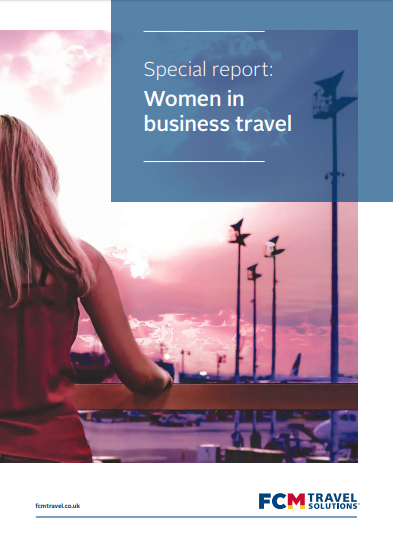Summary:
- A new report suggests that when it comes to business travel, male and female preferences and habits and are not that dissimilar;
- The 'Women in Business Travel' report from FCM Travel Solutions says that with just a few exceptions, the tastes and habits of both genders are the same;
- One notable difference which emerged is the reason for business travel. Meeting clients is the single biggest reason for men and internal meetings for women.
A new 'Women in Business Travel' report released by global business travel specialist FCM Travel Solutions has revealed that despite current public scrutiny of the gender pay gap and equal treatment of women in the workplace, when it comes to business travel, male and female preferences and habits and are not that dissimilar.
In 2016, research amongst female travel buyers and their travellers had found that, the main, travellers were treated equably. Only 21.94% said that women were treated less well than the men but 70.02% believed that travel suppliers should try harder to address the needs of female business travellers. The same research suggested a dis-engagement with travel policy. 77% felt policy should take account of female travellers' specific needs.
Women are a key part of the travel sector. The report highlights that nearly two-thirds of all travellers today are women and that women make 80% of all travel decisions. "That means 670 million women around the world control USD15 trillion in spending power, making female travellers a market twice the size of China and India's markets combined," it says.
So, two years on from its previous research has anything changed. Well, the latest report, based on a survey among 800 of FCM UK clients' business travellers, delivers some interesting findings on the travel trends of men and women, but overall suggests male and female business travellers are probably more similar, more homogeneous, than ever before.
"With just a few exceptions, the tastes and habits of both genders are the same. Corporate travel managers have yet to apply the principles of personalisation to gender needs other than under the catch-all umbrella of traveller safety," says the report.
FIND OUT MORE... Download: 'Women in Business Travel 2018'
Download: 'Women in Business Travel 2018'
The survey shows that most business travellers like to travel - women even more than men. Although the value of business travel lies in face-to-face interaction and meeting colleagues, over half of travellers enjoy the sheer experience of travel and exposure to different cultures. Women travel more for internal meetings than for meeting clients.
The biggest drawbacks of business travel across both genders are time spent away from the family, and a dislike of travelling alone. Women find business travel particularly disruptive to their work. The respondents say most business trips take travellers away for two nights and almost half (49%) of the surveyed travellers make less than ten trips a year; a third make between ten and twenty trips and a fifth make more than twenty trips a year.
Whilst women make more overnight stays than men, more men stay away for longer - 31.1% of women make less than ten trips a year, compared to 18% of men. Overall men are travelling slightly more than women, although women attend more events and conferences.
Air travel accounts for 71.4% of business trips among the respondents, rail for 26.6% and car rental for 23.7%. More women travel by train than men with the opposite applying to self-drive. A third of business travellers drive to the airport, marginally more than those who take taxis. Men are more likely to drive to the airport, the responses show. Once at the airport women hate wasting time at airports waiting and queuing, whereas delays and cancellations frustrate male travellers most.
Additionally the report shows more than half of business travellers would stay in an Airbnb, although fewer women are willing to do so than men they are more open to the concept than men. Bleisure also seems to be gaining traction amongst European business travellers with just under half of travellers occasionally extend their business stays for leisure.
"We made a decision to conduct research among our clients' travellers to get better insight in to the needs and preferences of female travellers versus men and whether corporate travel programs still require a more tailored approach," explains Jo Greenfield, UK general manager, FCM Travel Solutions. "With just a few exceptions, the tastes and habits of both genders are the same. Maybe Venus and Mars are closer to colliding than anyone realised."